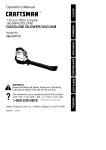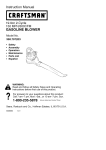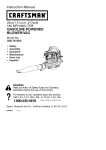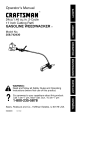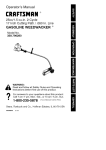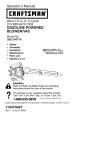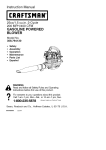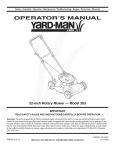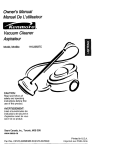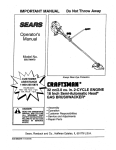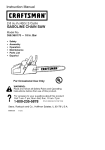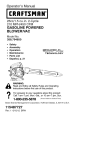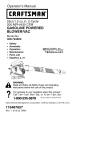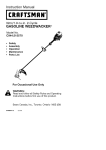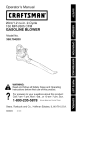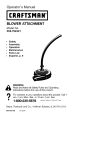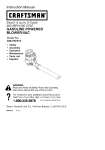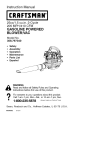Download Craftsman 358.797251 Operator`s manual
Transcript
Operator's Manual I CRAFTSMAN ° 1.9 cu.in./32cc 175 MPH/370 2-Cycle CFM GASOLINE BLOWERNAOUUM Model No. 358.797251 WARNING: Read and follow all Safety Rules and Operating Instructions before first use of this product. For answers Call 7 am-7 to your questions about this product: pm, Mon.-Sat., or 10 am-7 pm, Sun. 1-800-235-5878 Sears, Roebuck 530088701 7/28/00 and Co., Hoffman (Hours listed are Central Time) Estates, IL 60179 U.S.A. Warranty Statement Safety Rules Assembly Operation Maintenance Service & Adjustments FULL ONE YEAR WARRANTY 2 2 4 6 8 10 Storage Troubleshooting Table Emissions Statement Parts List Spanish Parts and Ordering ON CRAFTSMAN 11 12 12 14 17 Back ® GAS BLOWER For one (1) year from date of purchase, when this Gas Blower is maintained, lubricated, and tuned up according to the instructions in the operator's manual, Sears will repair, free of charge, any defects in material or workmanship. This warranty excludes blower tubes, spark plug, and air cleaner, which are expendable parts and become worn during normal use. If this blower is used for commercial purposes, this warranty applies for 90 days from the date of purchase. If this Blower is used for rental purposes, this warranty applies for 30 days from the date of purchase. This warranty applies only while this product is in use in the United States. WARRANTY SERVICE IS AVAILABLE BY RETURNING THE BLOWER TO THE NEAREST SEARS SERVICE CENTER IN THE UNITED STATES. This warranty gives you specific legal rights, and you may also have other rights which vary from state to state. Sears, Roebuck and Co., D/817WA, Hoffrnan Estates, IL 60179 _WARNING: Failure to follow all Safety Rules and Precautions can result in serious injury. KNOW YOUR UNIT • Read your Operator's Manual carefully until you completely understand and can follow all warnings and safety rules before operating the unit. • Restrict unit to users who understand and will follow all warnings and safety rules in this manual. PLAN AHEAD • Always wear eye protection when operating, servicing, or performing maintenance on unit. Wearing eye protection will help to prevent rocks or debris from being blown or ricocheting into eyes and face which can result in blindness and/or serious injury. Eye protection should meet the requirements of ANSI Z87.1. • Always wear foot protection. Do not go barefoot or wear sandals. • Always wear respirator or face mask when working with unit in dusty environments. • Secure hair above shoulder length. Secure or remove jewelry, loose clothing, or clothing with loosely hanging straps, ties, tassels, etc. They can be caught in moving parts. • Do not operate unit when you are tired, ill, upset, or if you are under the influence of alcohol, drugs, or medication. • Keep children, bystanders, and animals away from work area a minimum of 30 feet (10 meters) when starting or operating unit. Do not point the blower nozzle in the direction of people or pets. • Inspect the area before starting the unit. Remove all debris and hard objects such as rocks, glass, wire, etc. that can ricochet, be thrown, or otherwise cause injury or damage during operation. HANDLE FUEL WITH CAUTION, IT IS HIGHLY FLAMMABLE • Eliminate all sources of sparks or flame (including smoking, open flames, or work that can cause sparks) in the areas where fuel is mixed, poured, or stored. • Mixandpour fuelinanoutdoor area; store fuelinacool, dry,wellventilated place; useanapproved, marked container forallfuelpurposes. • Donotsmoke while handling fuelor while operating theunit. • Make suretheunitisproperly assembled andingoodoperating condition. • Donotfillfueltankwhileengine ishot orrunning. • Avoid spilling fueloroil.Wipe upfuel spills before starting engine. • Move atleast10feet(3meters) away fromfuelandfueling sitebefore startingengine. • Always storegasoline inacontainer approved forflammable liquids. OPERATE YOUR UNITSAFELY ,l_ WARNING: can hurt people or animals, break glass, or cause other damage. • Never run unit without the proper equipment attached. When using your unit as a blower, always install blower tubes. When using your unit as a vacuum, always install vacuum tubes and vacuum bag assembly. Make sure vacuum bag assembly is completely zipped. • Check air intake opening, blower tubes, vacuum tubes, and elbow tube frequently, always with engine stopped and spark plug disconnected. Keep vents and discharge tubes free of debris which can accumulate and restrict proper air flow. • Never place any object in air intake opening as this could restrict proper air flow and cause damage to unit. • Never use for spreading chemicals, fertilizers, or other substances which may contain toxic materials. • To avoid spreading fire, do not use near leaf or brush fires, fireplaces, barbecue pits, ashtrays, etc. • Use only for jobs explained in manual. Stop the engine before opening the vacuum inlet door. The engine must be stopped and the impeller blades no longer turning to avoid serious injury from the rotating blades. • Inspect unit before each use for worn, loose, missing, or damaged parts. Do not use until unit is in proper working order. • Keep outside surfaces and fuel. people, animals, glass, and solid objects such as trees, automobiles, walls, etc. The force of air can cause rocks, dirt, or sticks to be thrown or to ricochet which free from oil MAINTAIN YOUR UNIT PROPERLY • Have all maintenance other than the • Never start or run engine inside a closed room, building or other unventilated area. Breathing exhaust fumes can kill. • To avoid static electricity shock, do not wear rubber gloves or any other insulated gloves while operating unit. • Do not set unit on any surface except a clean, hard area while engine is running. Debris such as gravel, sand, dust, grass, etc. could be picked up by the air intake and thrown out through discharge opening, damaging unit, property, or causing serious injury to bystanders or operator. • Avoid dangerous environments. Do not use in unventilated areas or where explosive vapors or carbon monoxide build up could be present. • Do not overreach or use from unstable • • • • • recommended procedures described in the Operator's Manual performed by Sears Service. Disconnect spark plug before performing maintenance except for carburetor adjustments. Use only recommended CraftsmanZ replacement parts; use of any other parts may void your warranty and cause damage to your unit. Empty fuel tank before storing the unit. Use up fuel left in carburetor by starting engine and letting it run until it stops. Do not use any accessory or attachment other than those recommended by manufacturer for use with your unit. Do not store the unit or fuel in a closed area where fuel vapors can reach sparks or an open flame from hot water heaters, electric motors or switches, furnaces, etc. • Store in dry area out of reach of children. surfaces such as ladders, trees, steep slopes, rooftops, etc. Keep firm footing and balance at all times. • Never place objects inside blower tubes; always direct blowing debris away from 3 SPECIAL NOTICE: Forusers onU.S. nozzles must beassembled tounittobe Forest Land andinsome states, includinginfullcompliance withregulations. California(Public Resources Codes 4442 SPECIAL NOTICE: Exposure tovibraand4443), Idaho, Maine, Minnesota, New tions through prolonged useofgasoline Jersey, Oregon, andWashington: Certain powered hand tools could cause blood internal combustion engines operated on vessel ornerve damage infingers, hands, forest, brush, and/or grass covered landin andjoints ofpeople prone tocirculation theabove areas arerequired tobe disorders orabnormal swelling. Prolonged equipped withaspark arrestor, maintaineduseincold weather hasbeen linked to ineffective working order, ortheengine blood vessel damage inotherwise healthy must beconstructed, equipped, andmain- people. Ifsymptoms occur suchasnumbtained fortheprevention offire.Check ness, pain, lossofstrength, change inskin withyourstate orlocal authorities forregu- color ortexture, orlossoffeeling infinlations pertaining tothese requirements.gers, hands, orjoints, discontinue useof Failure tofollow these requirements isa thistoolandseekmedical attention. An violation ofthelaw.Thisunitisnotfactory antivibration system does notguarantee equipped withaspark arrestor; however, a theavoidance ofthese problems. Users spark arrestor isavailable asanoptional whooperate power tools onacontinual part. Ifaspark arrestor isrequired inyour andregular basis must monitor closely area, contact Sears Service forthecorrect theirphysical condition andthecondition kit.Thespark arrestor, blower tubes, and ofthistool. CARTON CONTENTS Check carton contents against thefollowing list. Model 358,797251 • • • • • • Blower Blower Nozzle Upper Lower Elbow tube vacuum vacuum tube BLOWER ASSEMBLY BLOWER TUBE ASSEMBLY If you have already assembled your unit for use as a vacuum, remove the vacuum tubes and collection bag. 1. Assemble the blower tube and tube tube nozzle to the unit by placing tabs in grooves and turning clockwise until locked in position. • Vacuum bag • Shoulder Strap • 2-Cycle Engine Oil NOTE: It is normal for the fuel filter to rattle in the empty fuel tank. Blower Tube Nozzle Blower Outle! ._'_/ _.D_ ____ ASSEMBLY ,i_ WARNING: Stop engine and be sure the impeller blades have stopped turning before opening the vacuum inlet door or attempting to insert or remove the vacuum or blower tubes. The rotating blades can cause serious injury. Always disconnect the spark plug before performing maintenance or accessing movable parts. ,_ WARNING: Groove Tabs SHOULDER STRAP ASSEMBLY (for blower use only) 1. Pass the shoulder strap over your head and onto your left shoulder. 2. Snap the hook onto the retainer on the top handle. If received assembled, repeat all steps to ensure your unit is properly assembled and all fasteners are secure. • Astandard screwdriver is required for assembly. Retainer j J" VACUUM ASSEMBLY VACUUM BAG ASSEMBLY If you have already assembled your unit for use as a blower, remove the blower tube, nozzle and shoulder strap. 1. Open the zipper on the vacuum bag and insert the elbow tube. 2. 6. 7. Insert the elbow tube into the blower outlet by placing tabs (inside blower outlet) in grooves and turning counterclockwise until locked in position. When converting back to the blower feature, make sure latch on the vacuum inlet cover is securely fastened. Push grooved end of the elbow tube through the small opening in the bag. Elbow Tube / Blower Outlet Elbow Tube // _j Small. Slanted End of Lower _-- Vacuum Tube Zipper Opening NOTE: Make sure edge of the small opening is flush against the rib on the elbow tube. 3. Close the zipper on the bag. Make sure the zipper is closed completely. VACUUM TUBE ASSEMBLY 1. Insert a screwdriver under the tab in the latch area on vacuum inlet cover. Latch _ Area/,__ Iw 1 _-_ 2. 3. 4. 5. _ / _-Outlet __ Blower ....Latch Area Inlet Cover Gently tilt the handle of the screwdriver forward toward blower outlet while pulling up on the vacuum inlet cover with your other hand. Hold the vacuum inlet cover open until upper vacuum tube is installed. Assemble upper vacuum tube to unit by placing locking tabs (located inside vacuum inlet) in grooves on tube; turn clockwise to tighten. Align slanted end of lower vacuum tube as shown. Firmly push lower vacuum tube into upper vacuum tube. Vacuum Inlet Cover \ Locking Tabs SHOULDER STRAP ADJUSTMENT (for vacuum bag) 1. Hold the unit as shown. 2. Pass the shoulder strap over your head and onto your left shoulder. 3. Snap the hook onto the retainer on the top handle. 4. Extend your right arm toward the rear of the vacuum bag. 5. Adjust shoulder strap until the vacuum bag/shoulder strap seam lies between your thumb and index finger. 6. Make sure air flows freely from the elbow tube into bag. If bag is kinked, the unit will not operate properly. / \ KNOW YOUR BLOWER READ THIS OPERATOR'S MANUAL AND SAFETY RULES BEFORE OPERATING YOUR UNIT Compare illustrations with your unit to familiarize yourself with the location of various controis and adjustments. Save this manual for future reference. MULCHING BLADES Your blower is equipped with mulching blades as a standard feature. When using the vacuum attachment, the mulching blades automatically reduce debris at a ratio of up to 16:1. _-, ...... Throttle Lock ^_(L_\_--_'!-- !'-_ Throttle Trigger ON/STOP I _::0" Switch .... ___ Choke Lever Primer ,, _ ",, _ _ ,'>-, Bulb _ ___._ Fuel Mix _, Blower Spark _:=== __ _ "Jtzz'e Tube Plug _1 r------- Fill Cap Starter Handle ! Upper Vacuum Lower Vacuum Tube Vacuum Bag _/with Elbow Tube ...... f s t°upder Tube ON/STOP SWITCH The ON/STOP switch is used to stop the engine. To stop the engine, hold the switch in the STOP position. PRIMER BULB The PRIMER BULB removes air from the carburetor and fuel lines and fills them with fuel. This allows you to start the engine with fewer pulls on the starter rope. Activate the primer bulb by pressing it and allowing it to return to its original form. THROTTLE LOCK The THRO-Fi-LE LOCK is used to hold the throttle in the run and starting positions. To activate throttle lock, squeeze and hold OPERATING TIPS • To reduce the risk of hearing loss associated with sound level(s), hearing protection is required. • To reduce the risk of injury associated with contacting rotating parts, stop the engine before installing or removing attachments. Do not operate without guard(s) in place. -6- throttle trigger, press and hold throttle lock, then release throttle trigger. THROTTLE TRIGGER The THROTTLE TRIGGER controls engine speed. Fully squeeze the trigger for full speed operation. CHOKE The CHOKE helps to supply fuel to the engine to aid in cold starting. Activate the choke by moving the choke lever to the FULL CHOKE position. After the engine attempts to start, move the choke to the HALF CHOKE position. Once the engine starts, move the choke lever to the OFF CHOKE position. • Operate power equipment only at reasonable hours-not early in the morning or late at night when people might be disturbed. Comply with times listed in local ordinances. Usual recommendations are 9:00 a.m. to 5:00 p.m., Monday though Saturday. • To reduce noise levels, limit the number of pieces of equipment used at any one time. • To reduce noise levels, operate power blowers at the lowest possible throttle speed to do the job. • Use rakes and brooms to loosen debris before blowing. • In dusty conditions, slightly dampen surfaces or use a mister attachment when water is available. • Conserve water by using power blowers instead of hoses for many lawn and garden applications, including areas such as gutters, screens, patios, grills, porches, and gardens. • Watch out for children, pets, open windows, or freshly washed cars. Blow debris away safely. • Use full blower nozzle extension so air stream can work close to the ground. • After using blowers and other equipment, CLEAN UP! Dispose of debris in trash receptacles. OPERATING POSITION Eye Protection Once oil is added to gasoline, shake container momentarily to assure that the fuel is thoroughly mixed. Always read and follow the safety rules relating to fuel before fueling your unit. IMPORTANT Experience indicates that alcohol blended fuels (called gasohol or using ethanol or methanol) can attract moisture which leads to separation and formation of acids during storage. Acidic gas can damage the fuel system of an engine while in storage. To avoid engine problems, empty fuel system before storage for 30 days or longer. Drain gas tank, start engine and let it run until fuel lines and carburetor are empty. Use fresh fuel next season. Never use engine or carburetor cleaner products in the fuel tank or permanent damage may occur. Fuel stabilizer is an acceptable alternative in minimizing the formation of fuel gum deposits during storage. Craftsman brand oil is already blended with fuel stabilizer. See the STORAGE section for additional information. STOPPING YOUR ENGINE ° Push and hold the STOP switch until the engine stops. ° If engine does not stop, move the choke to the FULL CHOKE position. BEFORE STARTING THE ENGINE You MUST make sure the tubes are se- BLOWER BEFORE VACUUM STARTING _i, WARNING: ENGINE Be sure to read the fuel information in the safety rules before you begin. If you do not understand the safety rules, do not attempt to fuel your unit. Call 1-800-235-5878. FUELING ENGINE This engine is certified to operate on unleaded gasoline. Before operation, gasoline must be mixed with a good quality 2-cycle air-cooled engine oil. We recommend Craftsman brand oil. Mix gasoline and oil at a ratio of 40:1 (A 40:1 ratio is obtained by mixing 3.2 ounces of oil with 1 gallon of unleaded gasoline). DO NOT USE automotive oil or boat oil. These oils will cause engine damage. When mixing fuel, follow instructions printed on container. cure before using the unit. ° Fuel engine. Move at least 10 feet (3 meters) away from the fueling site. ° Hold the unit in the starting position as shown. Make sure the blower end is directed away from people, animals, glass, and solid objects. STARTING POSITION BLOWER VACUUM ,_ WARNING: When starting engine, hold the unit as illustrated. Do not set unit on any surface except a clean, hard area when starting engine or while engine is running. Debris such as gravel, sand, dust, grass, etc. could be picked up by the airintake andthrown outthrough thedischarge opening, damaging theunitor property, orcausing serious injury tobystanders ortheoperator. Throttle Trigger Throttle Lock Switch Choke Lever _rpr._ STARTING A COLD ENGINE (or a warm engine after running out of fuel) 1. Activate the throttle lock as follows: • squeeze and hold throttle trigger; • press and hold throttle lock, then • release the throttle trigger 2. Move choke lever to FULL CHOKE position. 3. Slowly press primer bulb 6 times. 4. Pull starter rope handle sharply until engine attempts to run, but NO MORE THAN 6 PULLS. NOTE: If the engine sounds as if it is trying to start before the 6 th pull, go to the next step. 5. Move choke lever to HALF CHOKE position. 6. Sharply pull starter rope handle no more than 6 pulls, until engine runs. NOTE: If engine has not started after 6 pulls, repeat all of the above steps. 7. Allow engine to run for 10to 15 seconds, then move choke lever to the OFF CHOKE position. CUSTOMER Squeeze and release the throttle trigger to release the throttle lock and allow engine to idle. NOTE: If engine dies with choke at OFF CHOKE position, move the choke lever to the HALF CHOKE position and pull the starter rope handle 5 more times. If engine does not start and operate properly, refer to CARBURETOR ADJUSTMENT. 9. To stop engine, push and hold the STOP switch until the engine stops. STARTING A WARM ENGINE 1. Move choke lever to OFF CHOKE position. 2. Activate the throttle lock. 3. Press primer bulb 6 times. 4. Sharply pull the starter rope handle until the engine runs. 5. Squeeze and release the throttle trigger to release the throttle lock and allow engine to idle. NOTE: If engine does not run after 5 pulls, it is probably flooded. Wait a few minutes and repeat procedure with choke lever at OFF CHOKE. 6. To stop engine, push and hold the STOP switch until engine stops. DIFFICULT STARTING (or starting a flooded engine) Flooded engines can be started by placing choke lever in the OFF CHOKE position. Activate the throttle lock; then, pull rope until engine starts. After the engine starts, squeeze and release the throttle trigger to release the throttle lock and allow engine to idle. Starting could require pulling the starter rope handle many times depending on how badly unit is flooded. If unit still doesn't start, refer to the TROUBLESHOOTING TABLE or call 1-800-235-5878. RESPONSIBILITIES CARE & MAINTENANCE TASK WHEN TO PERFORM Before each use Before each use After each use Check for Loose fasteners and parts Check for damaged or worn parts Clean unit and labels Clean air filter Replace 8. Every 5 hours of operation Yearly spark plug -8- CLEAN ,_ WARNING: Stop engine and be AIR FILTER Screw sure the impeller blades have stopped turning before opening the vacuum inlet door or attempting to insert or remove the vacuum or blower tubes. The rotating blades can cause serious injury. Always disconnect the spark plug before performing maintenance or accessing movable parts. GENERAL RECOMMENDATIONS The warranty on this unit does not cover items that have been subjected to operator abuse or negligence. To receive full value from the warranty, the operator must maintain unit as instructed in this manual. Various adjustments will need to be made periodically to properly maintain your unit. CHECK FOR LOOSE FASTENERS AND PARTS • Spark Plug Boot • Air Filter • Housing Screws CHECK FOR DAMAGED OR WORN PARTS Contact Sears Service Center for replacement of damaged or worn parts. • ON/STOP Switch - Ensure ON/STOP switch functions properly by holding the switch in the STOP position. Make sure engine stops; then restart engine and continue. • Fuel Tank - Discontinue use of unit if fuel tank shows signs of damage or leaks. • Vacuum Bag - Discontinue use of vacuum bag if it is torn or damaged. CLEAN UNIT & LABELS • Clean the unit using a damp cloth with a mild detergent. • Wipe off unit with a clean dry cloth. -9- Air Filter Cover Air Filter Cleaning the air filter: A dirty air filter decreases engine performance and increases fuel consumption and harmful emissions. Always clean after every 5 hours of operation. 1. Clean the cover and the area around it to keep debris from falling into the carburetor chamber when the cover is removed. 2. Remove parts as illustrated. NOTE: Do not clean filter in gasoline or other flammable solvent. Doing so can create a fire hazard or produce harmful evaporative emissions. 3. Wash the filter in soap and water. 4. Allow filter to dry. 5. Apply a few drops of oil to the filter; squeeze filter to distribute oil. 6. Replace parts. REPLACE SPARK PLUG Replace spark plug each year to ensure the engine starts easier and runs better. Set spark plug gap at .025 in. Ignition timing is fixed, nonadjustable. 1. Twist, then pull off spark plug boot. 2. Remove spark plug from cylinder and discard. 3. Replace with Champion RCJ-8Y spark plug and tighten with a 3/4 in. socket wrench (10-12 ft.-Ibs). 4. Reinstall the spark plug boot. REPLACE FUEL FILTER To replace fuel filter, drain unit by running it dry of fuel, then remove fuel cap/ retainer assembly from tank. Pull filter from tank and remove it from the fuel line. Install new fuel filter on fuel line; reinstall parts. We recommend all service and adjustments not listed in this manual be performed by your Sears Service Center. CARBURETOR ADJUSTMENT Carburetor adjustment is critical and if done improperly can permanently damage the engine as well as the carburetor. If you require further assistance or are unsure about performing this procedure, call our customer assistance help line at 1-800-235-5878. Old fuel, a dirty air or fuel filter, or flooding may give the impression of an improperly adjusted carburetor. Check these conditions before adjusting the carburetor. The carburetor has been carefully set at the factory. Adjustments may be necessary if you notice any of the following conditions: • Engine will not idle. See IDLE SPEED and MIXTURE under adjusting procedure. • Engine dies or hesitates instead of accelerating. See ACCELERATION CHECK under adjusting procedure. • Loss of power. See MIXTURE under adjusting procedure. S2e'e Screw ............ _ O __,,,_,.__Oi _1_ Mixture Screw (with Limiter Cap) -10- ADJUSTING PROCEDURE CAUTION: Do not force plastic limiter caps on screws beyond the built-in stops or damage will occur. Initial Settings 1. Turn the mixture screw counterclock2. 3. wise until it stops. Turn the idle speed screw clockwise until it stops. Then turn counterclockwise 4 1/2 turns. Start motor and let it run for 3 minutes, then proceed to adjust screws according to the instructions below. If engine performance at initial settings is acceptable, no further adjustments are necessary. If engine does not start, refer to TROUBLESHOOTING TABLE. If still unable to remedy situation, call 1-800-235- 5878. Idle Speed "IDLE" Allow engine to idle. Adjust speed until engine runs without stalling. • Turn IDLE screw clockwise to increase engine speed. • Turn IDLE screw counterclockwise to decrease engine speed. Mixture "MIX" Allow engine to idle. Then accelerate the engine and note performance. If engine hesitates, bogs down, or smokes during acceleration, turn MIX screw clockwise in 1/16-turn increments until performance is satisfactory. Repeat this procedure as necessary for proper adjustment. After completing adjustments, check for acceleration. Reset if necessary. Acceleration Check If engine dies or hesitates instead of accelerating, turn MIX screw counterclockwise until you have smooth acceleration. Perform the following use: steps after each lizer to the gasoline in the fuel tank or fuel storage container. Follow the mix instructions found on stabilizer container. ,_ WARNING: Run engine at least 5 minutes after adding stabilizer. Craftsman 40:1,2-cycle engine oil (air cooled) is already blended with fuel stabilizer. If you do not use this Sears oil, you can add a fuel stabilizer to your fuel tank. • Allow engine to cool, and secure the unit before storing or transporting. • Store unit and fuel in a well ventilated area where fuel vapors cannot reach sparks or open flames from water heaters, electric motors or switches, furnaces, etc. • Store unit with all guards in place. Position unit so that any sharp object cannot accidentally cause injury. • Store unit and fuel well out of the reach of children. INTERNAL ENGINE • Remove spark plug and pour 1 teaspoon of 40:1,2-cycle engine oil (air cooled) through the spark plug opening. Slowly pull the starter rope 8 to 10 times to distribute oil. • Replace spark plug with new one of recommended type and heat range. • Clean air filter. Prepare unit for storage at end of season or if it will not be used for 30 days or more: EXTERNAL SURFACES • If your unit is to be stored for a period of time, clean it thoroughly before storage. Store in a clean dry area. FUEL SYSTEM Under FUELING ENGINE in the OPERATION section of this manual, see mes- • Check entire unit for loose screws, nuts, and bolts. Replace any damaged, broken, or worn parts. • At the beginning of the next season, use only fresh fuel having the proper gasoline to oil ratio. OTHER • Do not store gasoline from one season to another. sage labeled IMPORTANT regarding the use of gasohol in your engine. Fuel stabilizer is an acceptable alternative in minimizing the formation of fuel gum deposits during storage. Add stabi- -11 • Replace your gasoline can if it starts to rust. - TROUBLESHOOTING TABLE WARNING: Always stop unit and disconnect spark plug before performing any of the recommended remedies below other than remedies that require operation of the unit. TROUBLE Engine will not start. CAUSE 1. Move Ignition switch 3. Fuel tank empty. 3. Fill tank with correct 4. Spark plug not firing. 5. Fuel not reaching carburetor. 4. Install new spark plug. 6. Compression Engine will not idle properly. Engine smokes excessively. Engine runs hot. 2. See "Difficult section. low. 1. Carburetor requires adjustment. 2. Crankshaft seals worn. 3. Compression Engine will not accelerate, lacks power, or dies under a load. REMEDY 1. Ignition switch off. 2. Engine flooded. low. 1. Air filter dirty. 2. Spark in Operation fuel mixture. 5. Check for dirty fuel filter; replace. Check for kinked or split fuel line; repair or replace. 6. Contact Sears Service. 1. See Service 2. Contact 3. Contact and Adjustments air filter. spark plug 3. Carburetor requires adjustment. 4. Carbon build up. 4. Contact Sears Service. 5. Compression 5. Contact Sears Service. See Service low. section. Sears Service. Sears Service. 1. Clean or replace 2. Clean or replace and re-gap. plug fouled. to ON. Starting" and Adjustments section. 1. Choke partially on. 2. Fuel mixture incorrect. 1. Adjust choke. 2. Empty fuel tank and refill with correct fuel mixture. 3. Air filter dirty. 4. Carburetor requires adjustment. 3. Clean or replace air filter. 4. See Service and Adjustments 1. Fuel mixture incorrect. 2. Spark plug incorrect. 3. Carburetor requires adjustment 4. Carbon build up. 1. See "Fueling Engine". 2. Replace with correct spark 3. See Service 4. Contact YOUR WARRANTY RIGHTS AND OBLIGATIONS: The U. S. Environmental Protection Agency and Sears, Roebuck and Co., U.S.A., are pleased to explain the emissions control system warranty on your lawn and garden equipment engine. All new utility and lawn and garden equipment engines must be designed, built, and equipped to meet the stringent anti-smog standards. Sears must warrant the emission control system on your lawn and garden equipment engine for the periods of time listed below provided -12- and Adjustments section. plug. section. Sears Service. there has been no abuse, neglect, or improper maintenance of your lawn and garden equipment engine. Your emission control system includes parts such as the carburetor and the ignition system. Where a warrantable condition exits, Sears will repair your lawn and garden equipment engine at no cost to you. Expenses covered under warranty include diagnosis, parts and labor. MANUFACTURER'S WARRANTY COVERAGE: If any emissions related part on your engine (as listed under Emissions Control Warranty Parts List) is defective or a defect in the materials or workmanship of the engine causes the failure of such an emission related part, the part will be repaired or replaced by Sears. OWNER'S WARRANTY RESPONSIBILITIES: As the lawn and garden equipment engine owner, you are responsible for the performance of the required maintenance listed in your Owner's Manual. Sears recommends that you retain all receipts covering maintenance on your lawn and garden equipment engine, but Sears cannot deny warranty solely for the lack of receipts or for your failure to ensure the performance of all scheduled maintenance. As the lawn and garden equipment engine owner, you should be aware that Sears may deny you warranty coverage if your lawn and garden equipment engine or a part of it has failed due to abuse, neglect, improper maintenance, unapproved modifications, or the use of parts not made or approved by the original equipment manufacturer. You are responsible for presenting your lawn and garden equipment engine to a Sears authorized repair center as soon as a problem exists. Warranty repairs should be completed in a reasonable amount of time, not to exceed 30 days. If you have any questions regarding your warranty rights and responsibilities, you should contact your nearest authorized service center or call Sears at 1-800-473-7247 WARRANTY COMMENCEMENT DATE: The warranty period begins on the date the lawn and garden equipment engine is purchased. LENGTH OF COVERAGE: This warranty shall be for a period of two years from the initial date of purchase. WHAT IS COVERED: REPAIR OR REPLACEMENT OF PARTS, Repair or replacement of any warranted part will be performed at no charge to the owner at an approved Sears servicing center. If you have any questions regarding your warranty rights and responsibilities, you should contact your nearest authorized service center or call Sears at 1-800-473-7247. WARRANTY PE- -13- RIOD: Any warranted part which is not scheduled for replacement as required maintenance, or which is scheduled only for regular inspection to the effect of "repair or replace as necessary" shall be warranted for 2 years. Any warranted part which is scheduled for replacement as required maintenance shall be warranted for the period of time up to the first scheduled replacement point for that part. DIAGNOSIS: The owner shall not be charged for diagnostic labor which leads to the determination that a warranted part is defective if the diagnostic work is performed at an approved Sears servicing center. CONSEQUENTIAL DAMAGES: Sears may be liable for damages to other engine components caused by the failure of a warranted part still under warranty. WHAT IS NOT COVERED: All failures caused by abuse, neglect, or improper maintenance are not covered. ADD-ON OR MODIFIED PARTS: The use of add-on or modified parts can be grounds for disallowing a warranty claim. Sears is not liable to cover failures of warranted parts caused by the use of add-on or modified parts. HOW TO FILE A CLAIM: If you have any questions regarding your warranty rights and responsibilities, you should contact your nearest authorized service center or call Sears at 1-800-473-7247. WHERE TO GET WARRANTY SERVICE: Warranty services or repairs shall be provided at all Sears service centers. call: 1-800-473-7247. MAINTENANCE, REPLACEMENT AND REPAIR OF EMISSION RELATED PARTS: Any Sears approved replacement part used in the performance of any warranty maintenance or repair on emission related parts will be provided without charge to the owner if the part is under warranty. EMISSION CONTROL WARRANTY PARTS LIST: Carburetor, Ignition System: Spark Plug (covered up to maintenance schedule), Ignition Module. MAINTENANCE STATEMENT: The owner is responsible for the performance of all required maintenance as defined in the owner's manual.













